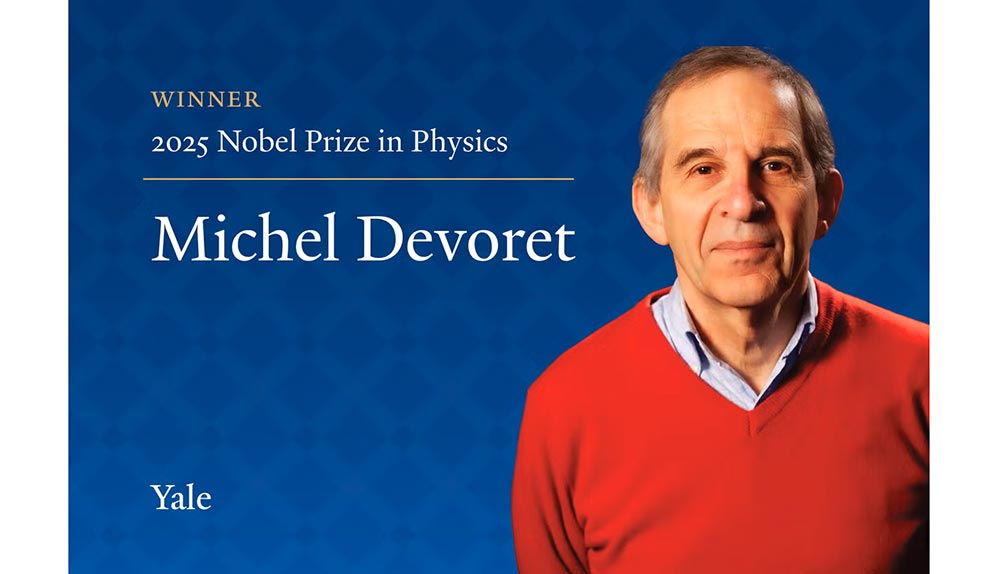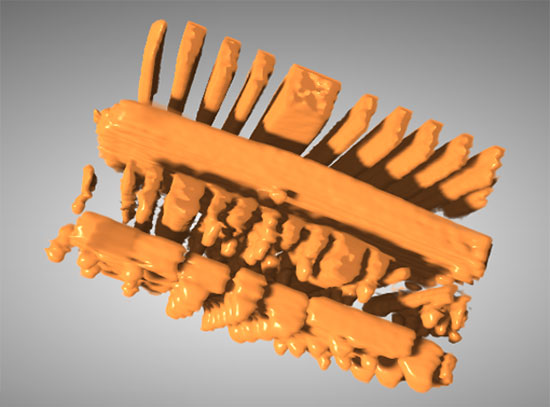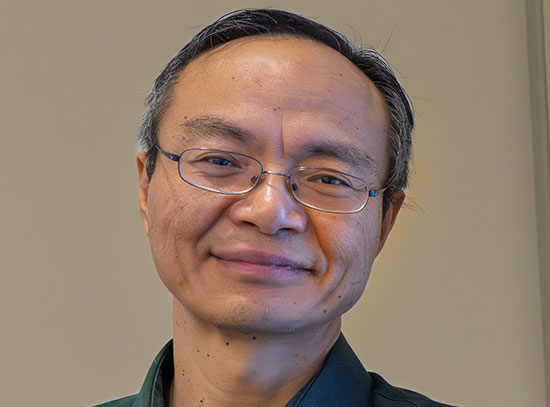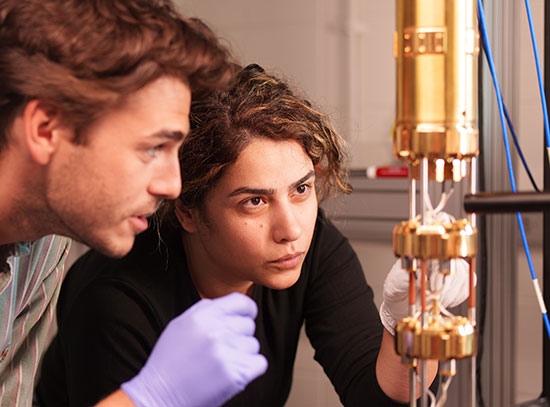Yale's Michel H. Devoret wins 2025 Nobel Prize in Physics
A 2025 Nobel Prize in Physics has been awarded to Yale Professor Emeritus of Applied Physics Michel H. Devoret "for the discovery of macroscopic quantum mechanical tunneling and energy quantization in an electric circuit."
October 14, 2025
By Jim Shelton

Editor’s note: The following press release was originally issued by Yale University. Michel Devoret — one of three 2025 Physics Nobel laureates — is a key member of the Co-design Center for Quantum Advantage (C2QA), a National Quantum Information Science Research Center led by the U.S. Department of Energy’s (DOE) Brookhaven National Laboratory and funded by the DOE Office of Science. Devoret led the C2QA research team that demonstrated the first quantum error correction significantly beyond break-even — an important milestone toward realizing scalable, fault-tolerant quantum computers. For more information on Brookhaven’s involvement, contact Danielle Roedel (droedel@bnl.gov, 631-344-2347).
Michel H. Devoret, the Frederick W. Beinecke Professor Emeritus of Applied Physics at Yale University, who has spent a career probing the intricate dynamics of qubits and quantum information, has won the 2025 Nobel Prize in Physics for his groundbreaking work in quantum computing. He is currently on faculty at the University of California-Santa Barbara.
The Royal Swedish National Academy made the announcement today.
Devoret, 72, who is a founding member of the Yale Quantum Institute, shares the prize with John Clarke of the University of California-Berkeley and John M. Martinis of the University of California-Santa Barbara.
The Nobel committee cited the trio’s research together in the 1980s that “revealed quantum physics in action.”
“Yale proudly cheers a trailblazer of a technology so consequential and far reaching that it may affect the life of every member of the planet,” said Yale President Maurie McInnis. “The work for which Professor Devoret is recognized, and his continued work over two decades with his Yale colleagues and others, helped launch a revolution in quantum mechanics.”
Devoret is a leading authority in the development of quantum technologies. Along with Yale colleagues Robert Schoelkopf and Steven Girvin, Devoret has conducted groundbreaking research in circuit quantum electrodynamics (circuit QED), an approach to quantum computing that uses particles of microwave light in a superconducting microwave resonator.
“The work Michel did with John Clarke and John Martinis demonstrated for the first time that electrical circuits big enough to see with your eye could still behave in a quantum way,” Girvin said. “It laid the groundwork for the construction of artificial atoms and led eventually to the work in quantum we’re seeing today.”
Devoret was born in France and earned degrees from the Ecole Nationale Superieure des Telecommunications in Paris and the University of Paris-Sud. He conducted some of the seminal design work on artificial atoms, or qubits, working in Clarke’s lab at the University of California-Berkeley in the 1980s. Devoret later started his own research group at the Commissariat à l’Energie Atomique (CEA) at Saclay, where he continued his fundamental research on quantum mechanical electronics and qubits with Daniel Esteve and Cristian Urbina.
Devoret spent a sabbatical year at Yale in 1999 and joined the faculty in 2002 — the year he and his Yale colleagues designed a superconducting qubit called the transmon qubit. With a decreased sensitivity to charge noise (an electrical field that can disrupt qubit performance), the transmon qubit would become widely used by other quantum researchers worldwide.
At Yale, he was professor of applied physics at Yale School of Engineering & Applied Science and had a secondary appointment in the Department of Physics in Yale’s Faculty of Arts and Sciences.
“Michel joined the Yale team with the idea that they could become a beacon for the science behind quantum information, that they could provide a place where the research community could find the resources they need as this field developed,” said Yale Engineering Dean Jeffrey Brock. “Michel is someone who sees science in the broadest terms, as a collaborative human endeavor.”
Yale Provost Scott Strobel said: “I am thrilled to learn of this recognition. Michel’s pioneering discoveries will leave an enduring legacy in the field of quantum and in the world beyond. Yale is proud to celebrate a member of its community who has devoted his life to seeking, expanding, and sharing knowledge — both at the university and with the greater world.”
At Yale, Devoret and his colleagues made a remarkable series of breakthroughs. They created the first rudimentary, solid-state quantum processor; discovered a new type of quantum “friction” that could lead to better storage of quantum memory; developed the first quantum system to cross the “break even” point in preserving a qubit for longer than the lifetime of its constituent parts; devised a system to predict “jumps” of quantum data; and created a device that combines the Schrödinger’s cat concept of superposition (a physical system existing in two states at once) with the ability to fix some of the trickiest errors in a quantum computation.
Currently Devoret, who was on Yale’s fulltime ladder faculty from 2002 until his retirement in mid-2024, is a professor emeritus and a research professor in Yale Engineering’s applied physics department. He is also chief scientist for Google Quantum AI.
Today’s Nobel honor recognizes pioneering work “that essentially kicked off an entire field of research,” said Sohrab Ismail-Beigi, chair of Yale’s Department of Applied Physics. “It showed that you can do controlled experiments to measure quantum behaviors of macroscopic objects, and within a few years there were experiments with quantum bits.”
Devoret has received numerous honors, including the Micius Quantum Prize, the Bell Prize (with Schoelkopf), the Fritz London Memorial Prize, the Ampere Prize of the French Academy of Science, the Descartes-Huygens Prize of the Royal Academy of Science of the Netherlands, the Comstock Prize in Physics (also with Schoelkopf), and the Europhysics-Agilent Prize of the European Physical Society. He is a member of the National Academy of Sciences, the American Academy of Arts and Sciences, and the French Academy of Sciences.
In addition to being a trailblazer in quantum research, Devoret is a teacher “whose impressive scientific work on technology is blended with humanistic thought,” said President McInnis. For instance, she cited a course, “Cinema and Physics: When the Birth of Cinema and the Scientific Revolution Met,” which Devoret co-taught at Yale with Francesco Casetti, the Sterling Professor of Humanities and Film and Media Studies in FAS; It explored the parallels between the evolution of art, science, and technology at the turn of the 20th century.
“They asked questions such as ‘Can the rigorous exploration of the world, the language of poets, the pleasure of the performance, the magic of discoveries, productively work together?’” McInnis said. “Professor Devoret once said, ‘You do the best work that you can. The results of that work have to be true, novel, and meaningful.’ His was, and Yale celebrates his Nobel prize today.”
2025-22659 | INT/EXT | Newsroom









